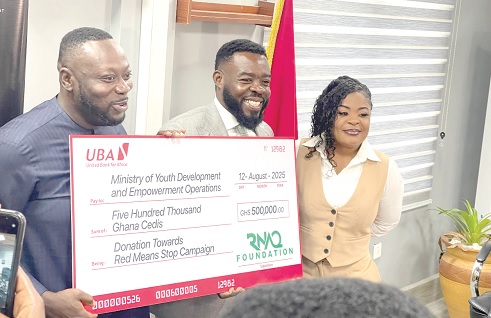The Ministry of Youth Development and Empowerment has received GH¢500,000 to bolster the country’s anti-drug initiative.
The funds will be channeled into combating opioid abuse among young people and financing research to address the root causes of the crisis.
Empowering communities
At a meeting with the Minister of Youth Development and Empowerment, George Opare Addo, in Accra last Tuesday, the Founder and Chairperson of the Richard Nii Armah Quaye (RNAQ) Foundation, Richard Nii Armah Quaye, reaffirmed his organisation’s commitment to uplifting vulnerable communities and fostering youth development.
“We are here to provide social justice to the deprived, the forgotten, and the marginalised.
“Beyond creating thousands of jobs for the youth, we also understand that not everyone is employable, and some even struggle to feed themselves,” he said.
Mr Quaye explained that while job creation remained a priority, the foundation had also established food banks in the Greater Accra Region with plans to expand nationwide to support those unable to secure employment.
“Those who cannot work to feed themselves should at least have a place to turn to for daily sustenance.
Neglect often drives people towards drugs, so these food banks are meant to provide comfort and reduce the pressure that pushes many into opioid abuse,” he said.
He stressed that the donation was more than just financial support; it was a pledge of long-term collaboration with the ministry to address deep-rooted social issues.
Appreciation
Mr Opare Addo expressed deep appreciation for the Foundation’s support in tackling drug abuse.
Speaking as part of International Youth Day celebration, the minister reflected on the theme, “Local Youth Action for SDGs and Beyond,” describing it as a reminder that young people were not just waiting for change, but also, they were driving it.
“We’ve seen the impact of people in our communities. In Ghana, the youth are leading in innovation, entrepreneurship, social activism and community development,” he said.
He emphasised that today’s youth were no longer passive beneficiaries of development programmes, but powerful agents of change, whose efforts were essential to the country’s progress.
Turning to the challenge of drug abuse, Mr Opare Addo revealed that the ministry’s strategy was anchored on five thematic areas, with a strong focus on the wellness and well-being of young people.
“Too many interventions are ad-hoc, so we have commissioned research to find out exactly what is driving young people into substance abuse,” he said.

